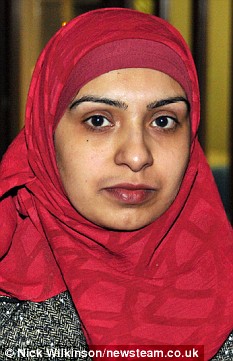A Muslim woman was left degraded and ashamed after her hijab was ripped from her head and used to strangle her. Barka Ali-Abdulla told a court she was left afraid for her life and unable to go out after she was attacked by Tanya Squires. Ms Abdulla, a Somali refugee, said she was left so devastated she is thinking of leaving Britain after living here for more than 20 years.
Squires, 21, who is three months pregnant, hurled a stone at her head in an unprovoked attack near Churchill Square, Brighton, in August. When Ms Abdulla, the mother of a young daughter, turned round Squires spat in her face and launched a vicious assault on her, Brighton Magistrates Court was told yesterday. Amanda Burrows, prosecuting, said: “Squires punched her hard in the eye and then pulled off her hijab, a traditional headscarf, which she used to try to strangle Ms Abdulla.”
Squires was given a five month prison sentence suspended for a year and was ordered to pay £200 compensation to her victim. She was also ordered to wear an electronic tag and not go out between 8pm and 6am until February 5.

 Saleca Faisal-Parkar, 31, was harassed, overlooked for jobs and training and was even branded “lazy” after she became seriously ill while pregnant.
Saleca Faisal-Parkar, 31, was harassed, overlooked for jobs and training and was even branded “lazy” after she became seriously ill while pregnant. The
The  Only two weeks in his post, Britain’s new immigration minister believes that hijab should not be allowed at British schools. “People wear veils for different reasons: some out of religious conviction. some because they’re forced to. It should be up to them,” Phil Woolas told
Only two weeks in his post, Britain’s new immigration minister believes that hijab should not be allowed at British schools. “People wear veils for different reasons: some out of religious conviction. some because they’re forced to. It should be up to them,” Phil Woolas told  Forty-six percent of primary and secondary school teachers suggested that allowing pupils to wear religious symbols went against British values. They also feared it would undermine the drive to promote religious and racial harmony in schools.
Forty-six percent of primary and secondary school teachers suggested that allowing pupils to wear religious symbols went against British values. They also feared it would undermine the drive to promote religious and racial harmony in schools.